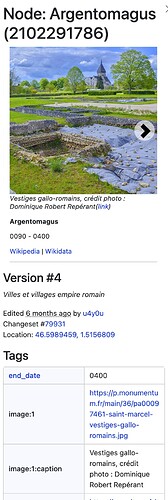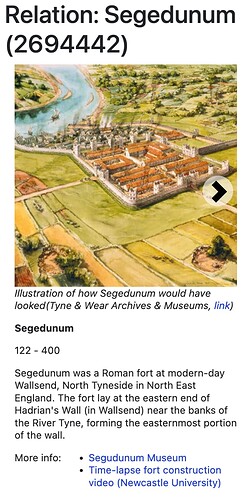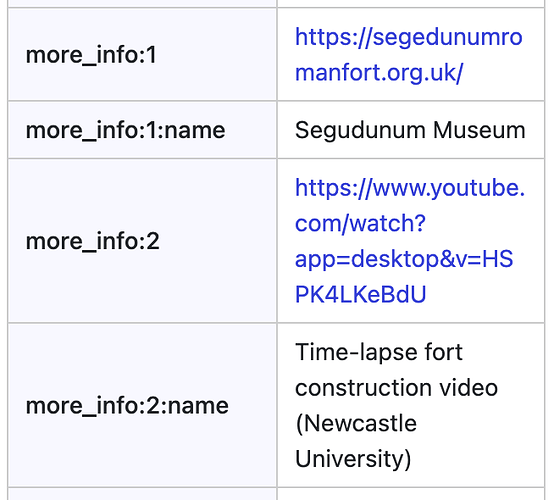Perish the thought! If I’d known that was what I was cracking open, I’d have chosen discretion as the better part of valor. I was, for the record, an OSM religious war draft dodger!
In this case, source:* format means like source:start_date=* is the source of the start_date=* tag, correct?
This pulls a thread I failed to include in my prior post: the general source:a:b:c=* tagging is more about the geometry drawn on the map. The *:source tags are about the characteristics of what the geometry represents. I think. Is that correct?
This would be very good to know. I think the editors do support the syntax, but only as free-form text entries, not as any sort of supported validation, autocomplete, etc.
One catch is that the OHM inspector supports enumerated tags for at least a couple of UI-exposed items: images and additional information links, which were intended to help users enrich the left-nav description of what they’ve mapped. See here.
and here:
Totally agree.
I’d suggest that few of our conventions are rock-solid yet, or certainly rock-solid enough to use as definitive guidance. I do think community project pages are important, especially for describing process, goals, inspirations, etc. But, at the end of the day, I’m expecting people to download the entirety of the OHM database for information and not the wiki. Likewise, I believe there will always be more OHM projects than project pages, even as valuable as they are.
But we’d need a consistent convention for referring to sources that are detailed elsewhere. I suppose some licenses also impose restrictions on how directly or indirectly we may incorporate a citation.
Indeed, and the closer we can put the citations to the actual data being cited, the better. We could even be a standard-bearer in this area. Or, at least try to be.
I’m reminded of the two common practices for citing sources on Wikidata. Some references (citations) are detailed in situ while others are represented by a simple stated in (P248) statement, sometimes with an extra pinpoint ID. In the long arc of time, every distinct work used as a source would have its own item there, but detailing the source’s metadata in situ is a reasonable first step. This would result in indirect citations if you only look at the raw XML, but as long as the user-facing website always resolves the citations, making them usable, then any charges of plagiarism can be avoided.
We could even outsource some of this metadata to Wikidata, relying on that project to supply the more tangential details about a source. As part of its WikiCite initiative, Wikipedia has been developing an approach in which it would store only the QID of a Wikidata item, plus pinpoint information like page numbers and excerpts. The main challenge is that we’d need to establish two-way communication with the Wikidata community so that items about sources don’t get deleted by accident. The Name Suggestion Index project has some experience managing this risk with the items it needs; overall, the partnership with Wikidata has been highly beneficial.
Totally agree that this should be our target - to have some sort of citation lookup system and I hope we can draft off of / act as a poster child for Wikicite. Also agree with your concerns about 2-way comms. That said, until then, I think we’re a little stuck… unless someone here has a clever idea? ![]()


